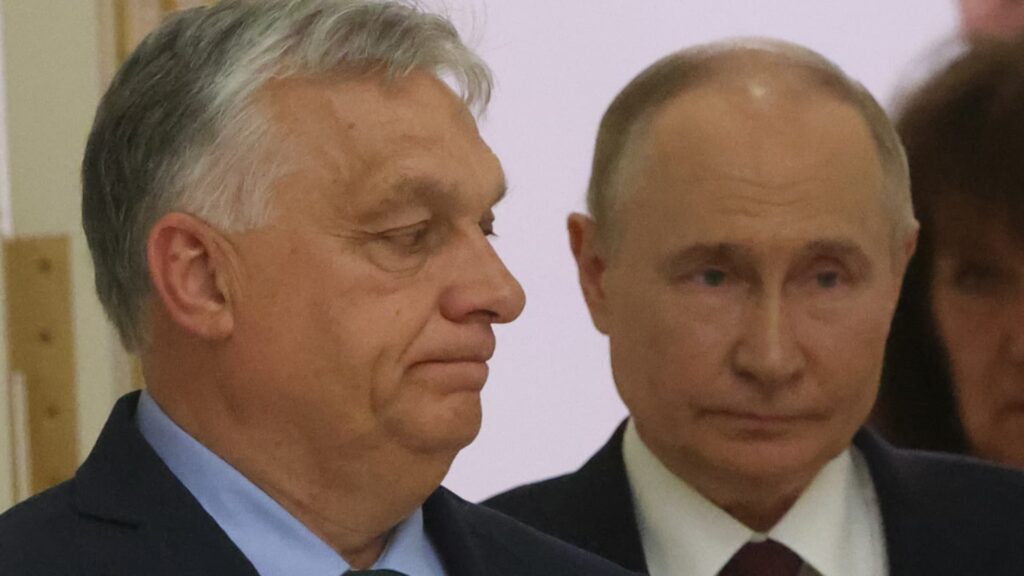Russian President Vladimir Putin and Hungarian Prime Minister Viktor Orban during their joint press conference at the Kremlin on July 5, 2024.
Contributor | Getty Images News | Getty Images
Russia’s allies in Eastern Europe say Brussels plans to end all Russian gas and energy imports in the coming years are tantamount to “economic suicide” and a threat to the region’s energy security and economy.
The European Commission announced plans on Tuesday to phase out Russian gas, nuclear energy and liquefied natural gas (LNG) imports by the end of 2027, saying the move “paves the way to ensure the EU’s full energy independence from Russia.”
Russia’s invasion of Ukraine in 2022 prompted the EU to ban most seaborne imports of Russian oil, coal and refined petroleum products, but reducing gas flows has proved more difficult. In 2024, almost 19% of the EU’s gas and LNG imports still came from Russia, according to data from the European Commission, although that’s down from 2021 when 45% of the region’s gas came from the major oil and gas exporter.
The EU’s latest proposals have already prompted a furious response from eastern European nations which have traditionally been more reliant on cheaper energy supplies from Russia, and which repeatedly warn of higher energy prices for consumers as a result of banning such supplies.
Slovakia and Hungary, whose governments have maintained warm ties with Moscow despite the war in Ukraine, described the EU’s latest plans as a “serious mistake” that would harm the region.
“We recognize the strategic goal of reducing energy dependence on third countries, and Slovakia is ready to work on this together with the European Union but … this is simply economic suicide to agree that neither gas, nor nuclear, nor oil [can be imported from Russia], that everything must end just because some new Iron Curtain is being built between the Western world and perhaps Russia and other countries,” Slovakian Prime Minister Robert Fico said Wednesday, in comments reported by Slovak news agency TASR and translated by Google.
In this pool photograph distributed by Russian state agency Sputnik, Russia’s President Vladimir Putin shakes hands with Slovakia’s Prime Minister Robert Fico prior to their talks in Moscow on Dec. 22, 2024.
Gavriil Grigorov | Afp | Getty Images
Hungarian Foreign Minister Péter Szijjártó said Wednesday that the EU’s proposals were “politically motivated” and a “serious mistake.”
“It threatens energy security, drives up prices and violates sovereignty. They want us to bear the cost of their reckless support for Ukraine and its rushed EU accession. We firmly reject this,” the minister commented on X.
Both Hungary and Slovakia have pushed back against previous EU initiatives to cut energy ties with Moscow, instead opting to maintain supplies amid fears of mounting energy costs at home.
Both have also been vocally critical of giving more military and financial assistance to Ukraine and have previously threatened refused to back the EU’s regular extensions of sanctions against Russia. Both looked to extract concessions from the bloc before approving their renewal, most recently in March.
In announcing its latest plans to distance itself from Russia, the EU said Tuesday that its “roadmap” to phasing out all Russian energy imports would first introduce a ban on all imports of Russian gas (both pipeline and LNG) under new contracts and existing spot contracts, which would take effect by the end of 2025, before all remaining imports are phased out by the end of 2027.
The Commission’s legislative proposals, to be presented in June, will require approval from the European Parliament and a qualified majority of member states, meaning the plans cannot be vetoed by just a few countries.
“We can adopt it without unanimity,” European Commissioner for Energy Dan Jorgensen said in a press conference Tuesday, adding, “I hope that everybody will vote for it, obviously, but if they don’t, that is also ok, that is also part of the European Union that sometimes the majority makes decisions when necessary.”
He added that the bloc was currently in an “unacceptable situation” in which it was dependent on a Russian state and leader, President Vladimir Putin, who had “chosen to weaponize energy.” He added that importing Russian gas had indirectly helped to fill the Kremlin’s “war chests” to continue its war against Ukraine.
The Commission said in its statement Tuesday that it envisaged a “gradual and well-coordinated” approach across bloc, with member states being asked to prepare national plans by the end of this year “setting out how they will contribute to phasing out imports of Russian gas, nuclear energy and oil.” It’s uncertain whether Slovakia and Hungary will accede to the request.
CNBC has asked the Kremlin for a response to the EU’s proposals and is awaiting a reply.


